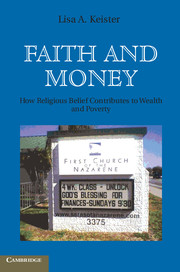5 - Wealth II
Financial Assets, Liabilities, and Multivariate Models
Published online by Cambridge University Press: 05 June 2012
Summary
We saw in Chapter 4 that household wealth ownership is unequally distributed in the United States, and that real assets in particular are owned disproportionately by some groups. Although inequality in the ownership of real assets is definitely high, inequality in the ownership of financial assets is even more extreme. Recall from Chapter 1 that financial assets are nontangible assets, monetary assets such as checking and savings accounts, stocks, and bonds. In this chapter, I continue my discussion of religion and wealth by showing how religious affiliation is associated with these components of total net worth. In particular, I examine the association between religious affiliation and ownership of cash (checking and savings) accounts, Certificates of Deposit (CDs), Individual Retirement Accounts (IRAs) and Keogh Accounts, life insurance with a cash value, pension plans, stocks, bonds, Treasury Bills (T-bills), and educational savings plans. I look at religious variation in the ownership of total financial assets, having very high or very low financial assets, the allocation of resources across types of financial assets, and the value of particular financial assets. In addition, I explore the role of liabilities in variations in net worth. Specifically, I explore how religious affiliation relates to total household debt, having extreme amounts (low and high) of debt, and the allocation of debt across categories. I end this chapter with a discussion of multivariate statistical models that synthesize the information I have provided thus far in this book. The multivariate models allow me to address how religion interacts with other influences on wealth ownership – such as family, educational, and work processes – to produce wealth outcomes.
- Type
- Chapter
- Information
- Faith and MoneyHow Religion Contributes to Wealth and Poverty, pp. 108 - 135Publisher: Cambridge University PressPrint publication year: 2011



